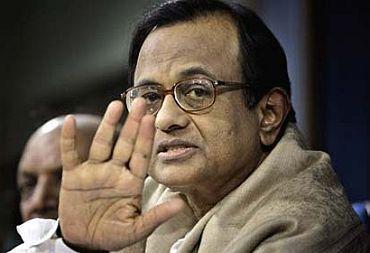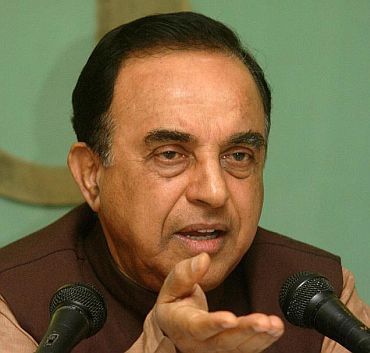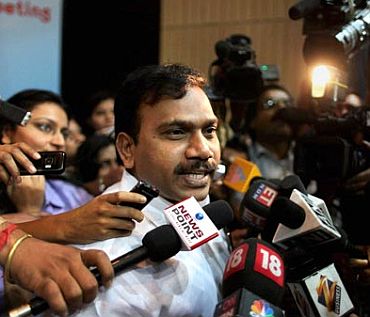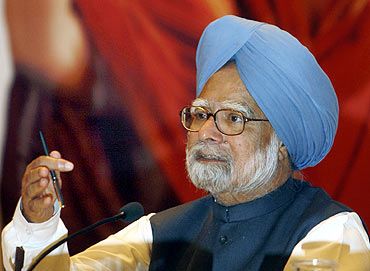 | « Back to article | Print this article |
Has Chidambaram been pushed to the wall in 2G case?
The Supreme Court on Monday reserved its order on the plea of Janata Party chief Subramanian Swamy and lawyer Prashant Bhushan's request to probe the alleged role of Home Minister P Chidambaram in the 2G scam. The plea of Swamy was countered by senior advocates of government and the Central Bureau of Investigation, both before a bench of justices GS Singhvi and AK Ganguly.
They insisted that there is no case against Chidambaram that can be sustained in the eye of law.
The defence arguments for Chidambaram have been going on for many days. However, Bhushan has not lost hope and he submitted a detailed explanation, as he sees it, of the 11-page note that was written by the finance ministry to Prime Minster's Office that was unearthed by an RTI activist.
Home Minister P Chidambaram was livid that such a note was made public. Even though Chidambaram and Finance Minister Pranab Mukherjee have declared truce, it seems that damage has already been done to the home minister.
The 11-page note is now part of Supreme Court records and no court can ignore it completely.
Bhushan wants the CBI to follow the leads given in the note. He told the apex court on Monday in his oral and written submission that, "It is clear that there are several problems in the CBI investigation, which if not rectified now may cause the prosecution case to collapse against the existing accused and also result in real big players and beneficiaries -- who caused this scam -- to get away."
Please click NEXT to read further...
'How can CBI give clean chit to Chidambaram without investigating?'
Bhushan also said, "Since that could shake the confidence of people in the efficacy of criminal justice system in the face of corruption in high places, therefore, by way of abundant caution, petitioners request this Hon'ble Court to appoint two or three persons with requisite expertise, credibility and experience to actively supervise the 2G investigations on a day-to-day basis. Such a step would strengthen the hands of investigators and would be useful for this Hon'ble Court in monitoring the investigations."
Government lawyers and the CBI are opposing any such appointments of supervisors.
During the last few hearings, lawyers who tried to defend Chidambaram said that, "The records show that there was no meeting between Raja and Chidambaram throughout this period (when the price of spectrums was fixed) and before January 10, 2008, and that all the discussion papers were seen and routed through the finance secretary to the finance minister and all the correspondence was seen and routed through the finance secretary."
However, Centre of Public Interest Litigation, the NGO of Bhushan and Swamy, produced the evidence in the court that the lawyers of CBI and government were not presenting the accurate picture.
Bhushan and Swamy asked how can CBI give 'clean chit' to Chidambaram without investigating?
The investigation is necessary against the home minister because the petitioners have filed a copy of the Office Memorandum dated 25.03.2011. This OM was given authenticity by none other than Pranab Mukherjee in the press conference on 29 September where "the truce" was declared between him and Chidambaram.
'Impossible for Raja to move ahead without concurrence of Chidambaram'
On Monday, Bhushan submitted detailed explanation and legal implication of that 11-page note that had created a crisis within government due to a public clash between Mukherjee and Chidambaram.
Bhushan told the judges, "This 11-page note clearly states that officials of the finance ministry repeatedly pointed out that spectrum allocation could not be determined by the entry fee of 2001, that it should be allocated through a market discovered price. Since, in our system, the finance ministry cannot be overruled by a line ministry, it was impossible for Mr Raja to move ahead without the concurrence of the then finance minister (P Chidambaram)."
Earlier lawyer K Venugopal, while arguing for the CBI, had strongly refuted that one ministry can't stop another ministry from taking decisions.
Bhushan argued that the facts that have emerged from the 11-page note written by Mukherjee's ministry to PMO states in paragraph 9 that the additional secretary, economic affairs, Sindhushree Khullar, on January 9, 2008, put up a comprehensive concept paper on telecom policy to Chidambaram referring to the exchange of letters between the MoF and the DoT on November 22 and November 29, 2007.
The note specifically recommended under section 19-25 multiple options for pricing spectrum through a market-based determination even in absence of an auction.
The note implies that Chidambaram did not enforce this methodology which could have met both market valuation on one hand and still complied with the government's claim of following first-come first-serve basis.
The government's OM also states that Chidambaram wrote a secret note to Prime Minister Manmohan Singh dated January 15, 2008, five days after the letters of intent were issued, that spectrum allocations made by DoT must be 'treated as a closed chapter'.
'It can't be Chidambaram's case that he was forced to follow TRAI recommendations'
He said this in Section 13 when he admitted in Section 10 of the same note that 'spectrum is a scarce resource and the price should be determined on scarce value and efficiency of usage.'
He further concluded that 'the most transparent method of allocating spectrum would be through auction. The method of auction will face least legal challenge...'
Despite Chidambaram recognising the above facts, he did not stand by his own finance secretary and additional secretary who had fought a valiant battle all the way till January 9, 2008. He chose to raise his voice only five days after the scam had been perpetrated.
The note also states in paragraph 12 that a meeting was held on January 30, 2008, between Chidambaram and accused Raja. Scarcity of spectrum and the resultant pricing of spectrum became a key issue in this meeting.
Bhushan drew attention of the Supreme Court that paragraph 13 in the note says that Chidambaram sent a 'non-paper' to Raja on April 21, 2008, conveying the in-principle decision on the agreement that spectrum can be priced only beyond 4.4 MHz.
The pricing of spectrum beyond contracted amount was also a part of the same recommendations by the Telecom Regulatory Authority of India. He found it okay to go against the TRAI recommendations beyond contracted amount but not upto contracted amount (which is what the finance secretary wanted to do).
TRAI recommendations, section 6.7 dated August 28, 2007, did not distinguish between 2G spectrum till and beyond contracted amount. It cannot be Chidambaram's case that he was forced to follow TRAI's recommendations on DoT's advice till 4.4 MHz.
If Chidambaram could have taken this stance for auctioning spectrum beyond the contracted amount, then he could have taken the exact same stance (consistent with his ministry officials) till the contracted amount and prevented the scam.
The note shows that Chidambaram sent out a non-paper to Raja on April 21, 2008 conveying an in principle decision may be taken to price spectrum beyond 4.4 MHz. But, only three days later, on April 24, the MoF abandoned the 4.4 MHz mark and instead agreed to price spectrum beyond 6.2 MHz.
The implication is 6.2 MHz minus 4.4 MHz, which equals 1.8 MHz multiplied by 279 UASL/CMTS licenses, which equals 502 MHz of prime 2G spectrum.
At 3G rates, according to the Comptroller and Auditor General, the value of this spectrum would total to approximately Rs 63,000 crores. At Unitech rates, it will amount to approximately Rs 35,000 crores.
'If Chidambaram is dragged in the case, PMO cannot remain untouched'
Bhushan told judges that, "Even current Telecom Minister Kapil Sibal, in his press release of January 29 stated that spectrum beyond 4.4 MHz for new entrants will be priced. But Chidambaram agreed to change his stance from 4.4 MHz to 6.2 MHz within 3 days and forced an additional loss on the exchequer. This decision of April 24, 2008 between the finance secretary and the DoT secretary flies in the face of Chidambaram's own position of January 15, 2008, the letter from the MoF to the DoT on April 17, 2008, and Chidambaram's non paper dated April 21, 2008."
Chidambaram met Raja on January 30, 2008 -- 20 days after Letter of Intents were issued to telecoms but before licenses or spectrum had been allocated. The minutes of the said meeting have been filed by Swamy in his last application.
Chidambaram accurately forecasted the scam in that meeting. Finance secretary and telecom secretary were present in the said meeting. Apart from the fact that in this meeting, Chidambaram did not chose to "revisit the current regime for entry fee or revenue share."
Chidambaram did not raise any objections to this illegal act and violation of the minutes of January 30, 2008 which not only allow acquisition but also the issue of charging any rent in such cases. Bhushan also said that it is on record that Chidambaram had approved the deals between Swan and Etisalat, and between Unitech and Telenor.
If Chidambaram had enforced the agreement he had reached with Raja with regard to the rent accrued to the government and the premium from such spectrum trading, then even at this late stage, the scam could have been partially prevented by ensuring that windfall gains were accrued to the public exchequer and not to companies such as Swan, Unitech, etc.
Chidambaram did no such thing and ignored what he had already forecasted; instead he ignored the illegally modified M&A guidelines of April 22, 2008, and later approved Swan and Unitech equity infusions which, according to the CAG, indicate a massive loss to the exchequer.
Bhushan in his submission on Monday also said that even the prime minister had favoured auction of spectrum. However, Raja and Chidambaram jointly decided on spectrum pricing and allowed the licenses to be traded, and conveyed their joint decision to the PM.
It's alleged that Chidambaram overruled his own officials. Both the issue of spectrum pricing and sale of license were part of the CBI FIR. It is thus clear that CBI has given a clean-chit to Chidambaram ignoring the above overwhelming evidence without even investigating the same, Bhushan argued.
Bhushan's submission also implied that government has no option but to defend the position taken by Chidambaram because the 11-page note, if taken into consideration, suggests that if Chidambaram is dragged in the case, PMO cannot remain untouched.




